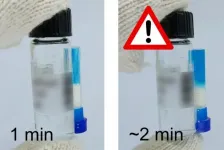(Press-News.org) Harvard University researchers have identified the biological mechanism of how chronic stress impairs hair follicle stem cells, confirming long-standing observations that stress might lead to hair loss.
In a mouse study published in the journal Nature, the researchers found that a major stress hormone causes hair follicle stem cells to stay in an extended resting phase, without regenerating the hair follicle and hair. The researchers identified the specific cell type and molecule responsible for relaying the stress signal to the stem cells, and showed that this pathway can be potentially targeted to restore hair growth.
"My lab is interested in understanding how stress affects stem cell biology and tissue biology, spurred in part by the fact that everyone has a story to share about what happens to their skin and hair when they are stressed. I realized that as a skin stem cell biologist, I could not provide a satisfying answer regarding if stress indeed has an impact -- and more importantly, if yes, what are the mechanisms," said Ya-Chieh Hsu, Ph.D., the Alvin and Esta Star Associate Professor of Stem Cell and Regenerative Biology at Harvard and senior author of the study. "The skin offers a tractable and accessible system to study this important problem in depth, and in this work, we found that stress does actually delay stem cell activation and fundamentally changes how frequently hair follicle stem cells regenerate tissues."
The hair follicle is one of the few mammalian tissues that can undergo rounds of regeneration throughout life, and has become a paradigm that informs much of our fundamental understanding of mammalian stem cell biology. The hair follicle naturally cycles between growth and rest, a process fueled by hair follicle stem cells. During the growth phase, hair follicle stem cells become activated to regenerate the hair follicle and hair, and hairs grow longer each day. During the resting phase, the stem cells are quiescent and hairs can shed more easily. Hair loss can occur if the hairs shed and the stem cells remain quiescent without regenerating new tissue.
The researchers studied a mouse model of chronic stress and found that hair follicle stem cells stayed in a resting phase for a very long time without regenerating tissues. A major stress hormone produced by the adrenal glands, corticosterone, was upregulated by chronic stress; providing corticosterone to mice was able to reproduce the stress effect on the stem cells. The equivalent hormone in humans is cortisol, which is also upregulated under stress and is often referred to as the "stress hormone."
"This result suggests that elevated stress hormones indeed have a negative effect on hair follicle stem cells," Hsu said. "But the real surprise came when we took out the source of the stress hormones."
Under normal conditions, hair follicle regeneration slows over time -- the resting phase becomes longer as the animals age. But when the researchers removed the stress hormones, the stem cells' resting phase became extremely short and the mice constantly entered the growth phase to regenerate hair follicles throughout their life, even when they were old.
"So even the baseline level of stress hormone that's normally circulating in the body is an important regulator of the resting phase. Stress essentially just elevates this preexisting 'adrenal gland-hair follicle axis,' making it even more difficult for hair follicle stem cells to enter the growth phase to regenerate new hair follicles," Hsu said.
After establishing the link between the stress hormone and hair follicle stem cell activity, the researchers looked for the biological mechanism underlying the connection.
"We first asked whether the stress hormone was regulating the stem cells directly and checked by taking out the receptor for corticosterone, but this turned out to be wrong. Instead, we found that the stress hormone actually acts on a cluster of dermal cells underneath the hair follicle, known as the dermal papilla," said Sekyu Choi, Ph.D., the lead author of the study.
Dermal papilla is known to be critical for activating hair follicle stem cells, but none of the previously identified factors secreted from dermal papilla changed when stress hormone levels were altered. Rather, the stress hormone prevented dermal papilla cells from secreting Gas6, a molecule that the researchers showed can activate the hair follicle stem cells.
"Under both normal and stress conditions, adding Gas6 was sufficient to activate hair follicle stem cells that were in the resting phase and to promote hair growth," Choi said. "In the future, the Gas6 pathway could be exploited for its potential in activating stem cells to promote hair growth. It will also be very interesting to explore if other stress-related tissue changes are related to the stress hormone's impact on regulating Gas6."
These initial findings in mice need to be further studied before they can be safely applied to humans. Harvard's END
How chronic stress leads to hair loss
Harvard researchers identify mechanism for regenerating hair follicle stem cells
2021-03-31
ELSE PRESS RELEASES FROM THIS DATE:
Scientists at CERN successfully laser-cool antimatter for the first time
2021-03-31
Swansea University physicists, as leading members of the ALPHA collaboration at CERN, have demonstrated laser cooling of antihydrogen atoms for the first time. The groundbreaking achievement produces colder antimatter than ever before and enables an entirely new class of experiments, helping scientists learn more about antimatter in future.
In a paper published today in Nature, the collaboration reports that the temperature of antihydrogen atoms trapped inside a magnetic bottle is reduced when the atoms scatter light from an ultraviolet laser beam, slowing the atoms down and reducing the space they occupy in the bottle -- both vital aspects of future more detailed ...
Temperature sensor could help safeguard mRNA vaccines
2021-03-31
Scientists have developed vaccines for COVID-19 with record speed. The first two vaccines widely distributed in the U.S. are mRNA-based and require ultracold storage (-70 C for one and -20 C for the other). Now, researchers reporting in ACS Omega have developed a tamper-proof temperature indicator that can alert health care workers when a vial of vaccine reaches an unsafe temperature for a certain period, which could help ensure distribution of effective mRNA vaccines.
The two COVID mRNA vaccines contain instructions for building harmless pieces of the SARS-CoV-2 spike protein. Once the vaccine is injected into the body, human cells use the mRNA instructions to make the spike protein, which they temporarily ...
Can drinking cocoa protect your heart when you're stressed?
2021-03-31
Increased consumption of flavanols - a group of molecules occurring naturally in fruit and vegetables - could protect people from mental stress-induced cardiovascular events such as stroke, heart disease and thrombosis, according to new research.
Researchers have discovered that blood vessels were able to function better during mental stress when people were given a cocoa drink containing high levels of flavanols than when drinking a non-flavanol enriched drink.
A thin membrane of cells lining the heart and blood vessels, when functioning efficiently the endothelium helps ...
Study details how Middle East dust intensifies summer monsoons on Indian subcontinent
2021-03-31
LAWRENCE -- New research from the University of Kansas END ...
Revealing meat and fish fraud with a handheld 'MasSpec Pen' in seconds
2021-03-31
Meat and fish fraud are global problems, costing consumers billions of dollars every year. On top of that, mislabeling products can cause problems for people with allergies, religious or cultural restrictions. Current methods to detect this fraud, while accurate, are slower than inspectors would like. Now, researchers reporting in ACS' Journal of Agricultural and Food Chemistry have optimized their handheld MasSpec Pen to identify common types of meat and fish within 15 seconds.
News stories of food fraud, such as beef being replaced with horse ...
Dramatic increases seen in rates of insomnia, sleep apnea among US military
2021-03-31
SAN ANTONIO (March 31, 2021) -- Insomnia and obstructive sleep apnea have increased dramatically among active-duty military members over a 14-year period, 2005 through 2019.
Insomnia increased 45-fold and sleep apnea went up more than 30-fold, according to a study led by The University of Texas Health Science Center at San Antonio (UT Health San Antonio).
The study found that the most likely military member to be diagnosed with either sleep disorder was married, male, white, a higher-ranking enlisted Army service member and age 40 or older.
The researchers compared medical codes that represent diagnosis of sleep apnea or insomnia in active-duty Army, Navy, Marine Corps and Air Force personnel. No medical ...
Study identifies risk factors for COVID-19 infection, hospitalization, and mortality among U.S. nursing home residents
2021-03-31
Risks of SARS-CoV-2 coronavirus infection for long-stay nursing home residents were mainly dependent on factors in their nursing homes and surrounding communities, according to a large study led by a researcher at the Johns Hopkins Bloomberg School of Public Health.
By contrast, the study found that the risks of being hospitalized with, and of dying from, COVID-19, depended more on patient-specific characteristics such as age and body mass index--although the mix of factors linked to hospitalization was distinct from the mix of factors linked to mortality.
The study, which appears online March 31 in JAMA Network Open, detailed COVID-19 risk factors among more than 480,000 long-stay nursing home residents in the ...
In search of the first bacterium
2021-03-31
Roughly five years ago, Institute Head Prof. Dr. William (Bill) Martin and his team introduced the last universal common ancestor of all living organisms and named it "LUCA". It lived approximately 3.8 billion years ago in hot deep sea hydrothermal vents.
Now the evolutionary biologists in Duesseldorf have described a further ancient cell named "LBCA" ("Last Bacterial Common Ancestor"). It is the ancestor of today's largest domain of all living organisms: Bacteria. In Communications Biology, they report on their new research approaches which led to the successful prediction ...
Estimating lifetime microplastic exposure
2021-03-31
Every day, people are exposed to microplastics from food, water, beverages and air. But it's unclear just how many of these particles accumulate in the human body, and whether they pose health risks. Now, researchers reporting in ACS' Environmental Science & Technology have developed a lifetime microplastic exposure model that accounts for variable levels from different sources and in different populations. The new model indicates a lower average mass of microplastic accumulation than previous estimates.
Microplastics, which are tiny pieces of plastic ranging in size from 1 μm to 5 mm (about the ...
Urban growth creates distortions between providers and receivers of ecosystem services
2021-03-31
In Brazil, researchers are puzzling over socioeconomic and environmental indicators that do not add up. They are concerned with what they call the São Paulo Macrometropolitan Area, a mega-region comprising five metropolitan areas in the state of São Paulo with a total of 180 municipalities, some of which provide ecosystem services while others receive them. The problem is that the former, which provide the others with water, food and power generation inputs, suffer from steep inequities in terms of defective human development and lack of social inclusion.
"Urban centers have always been ...
LAST 30 PRESS RELEASES:
New knowledge on heritability paves the way for better treatment of people with chronic inflammatory bowel disease
Under the Lens: Microbiologists Nicola Holden and Gil Domingue weigh in on the raw milk debate
Science reveals why you can’t resist a snack – even when you’re full
Kidney cancer study finds belzutifan plus pembrolizumab post-surgery helps patients at high risk for relapse stay cancer-free longer
Alkali cation effects in electrochemical carbon dioxide reduction
Test platforms for charging wireless cars now fit on a bench
$3 million NIH grant funds national study of Medicare Advantage’s benefit expansion into social supports
Amplified Sciences achieves CAP accreditation for cutting-edge diagnostic lab
Fred Hutch announces 12 recipients of the annual Harold M. Weintraub Graduate Student Award
Native forest litter helps rebuild soil life in post-mining landscapes
Mountain soils in arid regions may emit more greenhouse gas as climate shifts, new study finds
Pairing biochar with other soil amendments could unlock stronger gains in soil health
Why do we get a skip in our step when we’re happy? Thank dopamine
UC Irvine scientists uncover cellular mechanism behind muscle repair
Platform to map living brain noninvasively takes next big step
Stress-testing the Cascadia Subduction Zone reveals variability that could impact how earthquakes spread
We may be underestimating the true carbon cost of northern wildfires
Blood test predicts which bladder cancer patients may safely skip surgery
Kennesaw State's Vijay Anand honored as National Academy of Inventors Senior Member
Recovery from whaling reveals the role of age in Humpback reproduction
Can the canny tick help prevent disease like MS and cancer?
Newcomer children show lower rates of emergency department use for non‑urgent conditions, study finds
Cognitive and neuropsychiatric function in former American football players
From trash to climate tech: rubber gloves find new life as carbon capturers materials
A step towards needed treatments for hantaviruses in new molecular map
Boys are more motivated, while girls are more compassionate?
Study identifies opposing roles for IL6 and IL6R in long-term mortality
AI accurately spots medical disorder from privacy-conscious hand images
Transient Pauli blocking for broadband ultrafast optical switching
Political polarization can spur CO2 emissions, stymie climate action
[Press-News.org] How chronic stress leads to hair lossHarvard researchers identify mechanism for regenerating hair follicle stem cells





